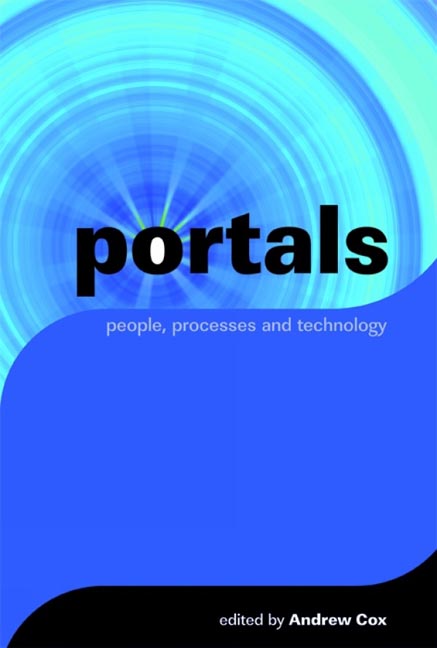Book contents
- Frontmatter
- Contents
- Introductory preface
- Section 1 Core themes
- 1 Definitions and debates
- 2 Portals or filters? Identifying quality on the internet
- 3 Portal architectures
- 4 Personalization initiatives in the public and academic domains
- 5 User needs analysis and evaluation of portals
- 6 Managing portal services
- Section 2 The library and the portal
- Section 3 The portal in the corporate sector
- Section 4 Portals in the public sector
- Section 5 The future
- The contributors
- Index
1 - Definitions and debates
from Section 1 - Core themes
Published online by Cambridge University Press: 09 June 2018
- Frontmatter
- Contents
- Introductory preface
- Section 1 Core themes
- 1 Definitions and debates
- 2 Portals or filters? Identifying quality on the internet
- 3 Portal architectures
- 4 Personalization initiatives in the public and academic domains
- 5 User needs analysis and evaluation of portals
- 6 Managing portal services
- Section 2 The library and the portal
- Section 3 The portal in the corporate sector
- Section 4 Portals in the public sector
- Section 5 The future
- The contributors
- Index
Summary
Many writers who have written about portals have been worried by the difficulty of defining exactly what the term itself means. The authors in this book again tussle with the issue. The evidence of the book seems to be that however diverse the meanings attached to the word, it does seem to encapsulate important issues for those working to support the use of information. Thus information professionals are likely to find themselves not only explaining to users what different forms of portal are and how they work, but also developing online services which work within wider organizational portal frameworks, and perhaps actually helping to develop or manage their own portals.
This chapter starts the reader thinking about some of the key questions, explored in greater depth in subsequent chapters, and also provides a guide to some of the relevant literature.
Definitions
The reader might take a moment to consider which (if any) of the following they would consider to be a portal:
• Direct.gov (www.direct.gov.uk/)
• University of Durham's duo (Murray, 2003)
• My Caledonian, Glasgow Caledonian's portal (McKay, 2003)
• Metalib/SFX at Loughborough library – ‘eResource portal’ (http://metalib.lboro. ac.uk/)
• CSA MultiSearch (www.csa.com/e_products/multisearch_login.php)
• Ingenta connect (www.ingentaconnect.com/)
• National electronic Library for Health (NeLH) (www.nelh.nhs.uk/)
• The NHS core content collection
• The National Library for Health (www.library.nhs.uk/)
• The North East Regional Portal (www.northeastofengland.com/)
• SOSIG (www.sosig.ac.uk/)
• Yahoo! (http://uk.yahoo.com/)
• Google (… Amazon, eBay, Wikipedia, the BBC).
When this chapter was being written the top hit on the UK web in Google for the single search term ‘portal’ was Direct.gov. Interestingly, in its own description of itself the word portal is never used. Rather, it would seem that other people have decided it is a portal, by describing it as such in the descriptive text associated with their links to it. On this basis Google has labelled it a portal. Both duo and My Caledonian are ‘institutional portals’ – the university equivalent of enterprise information portals – but though screenshots suggest a strong similarity in what is being offered it seems that the underlying technological base is very different: one is built from an e-learning system (a virtual learning environment) and the other from the student record system. This suggests that they might be run by different people, have different paths of development, etc.
- Type
- Chapter
- Information
- Portalspeople, processes and technology, pp. 3 - 13Publisher: FacetPrint publication year: 2006



